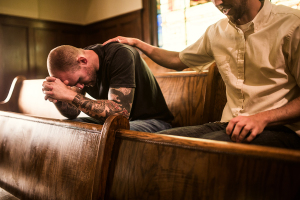Do infants and the mentally challenged go to Heaven when they die?

Have you or someone you know ever suffered a miscarriage or lost a young child? Do you have a loved family member who has mental challenges and can’t understand things like you and I do?
You’ve heard it said all the time in Christian circles that no one is eternally lost because of their sin, but rather because they fail to receive Christ as their Lord and Savior. Fine, but what happens to those who are unable to make that decision, such as infants and those with mental handicaps, when they die? Are they lost?
Short answer: no. Long answer: keep reading.
The sin infection
The Bible is unequivocal on the subject of whether we all have a sin nature. Everyone is born in sin (Ps. 51:5), spiritually dead from the start (Eph. 2:1), “by nature children of wrath” (Eph. 2:3), and morally incapable of coming to Christ by ourselves (John 6:44, 1 Cor. 2:14, Rom. 8:6-7).
We’re not sinners because we sin, we sin because we’re sinners — a doctrine in Christianity labeled “total depravity,” a term that can be a bit misleading. Total depravity doesn’t mean we’re as bad as we can be, but rather we are as bad off as we can be where our starting relationship with God is concerned.
No matter how you slice it, the sinful “us” is there. R. C. Sproul says, “If each one of us is born without a sinful nature, how do we account for the universality of sin? If four billion people were born with no inclination to sin, with no corruption to their nature, we would reasonably expect that at least some of them would refrain from falling ... But if everybody does it, without exception, then we begin to wonder why.”
Exactly. This is why Reinhold Niebuhr once remarked, “The doctrine of original sin is the only empirically verifiable doctrine of the Christian faith.”
So, if we’re all in the same boat from a sin perspective including babies and those with mental challenges, how do they spend eternity with God if they die without receiving Christ? Keep reading.
Some key distinctions
To begin, it’s important to understand the theological distinction between original sin and original guilt. Our inherited sin nature is sometimes referred to as original sin, meaning our initial sinful state. While God created Adam and Eve in His own likeness (Gen. 5:1), the Bible says that, once Adam and Eve fell, Adam fathered children “in his own likeness” (Gen. 5:3; cf. Rom. 5:12), which included his polluted nature.
However, the Bible nowhere says that the original parent’s guilt and penalty before God is transferred to their descendants. Rather, the Bible says that “everyone will die for his own iniquity” (Jer. 31:30), meaning that you and I are not held responsible for our original parent’s sin — only our own.
That’s step one.
Step two is apprehending the biblical distinction between a person committing evils and the culpability assigned by God to that person for those transgressions. Naturally, a prerequisite of that accountability is understanding right and wrong.
The Scripture indicates that a person who has not yet acquired that level of comprehension is not guilty before God for their sin. Most of us reach the point where we “will know enough to refuse evil and choose good” (Is. 7:16; sometimes called “the age of accountability”), but some never do.
Jesus alludes to this in John’s account of His healing of the man born blind. After He refers to the crowd as being spiritually blind, the Pharisees said to Him, “We are not blind too, are we?” Jesus responds, “If you were blind, you would have no sin; but since you say, ‘We see,’ your sin remains” (John 9:39-41, my emphasis).
An interesting and important point.
Paul describes his own process of reaching an understanding of God’s Law that led him to “see” his sin before God and become guilty for that sin: “I was once alive apart from the Law; but when the commandment came, sin became alive and I died; and this commandment, which was to result in life, proved to result in death for me; for sin, taking an opportunity through the commandment, deceived me and through it killed me” (Rom. 7:9-11).
So where does all this leave us?
In my opinion, there are enough scriptural breadcrumbs to follow, including others we haven’t covered (e.g., David testifying to the fact that he would be reunited with his dead child in Heaven; 2 Sam 12:23), to reasonably conclude that infants and those with mental disabilities who do not understand right/wrong, who have not received Christ will spend eternity with God should they die in that condition.
Robin Schumacher is an accomplished software executive and Christian apologist who has written many articles, authored and contributed to several Christian books, appeared on nationally syndicated radio programs, and presented at apologetic events. He holds a BS in Business, Master's in Christian apologetics and a Ph.D. in New Testament. His latest book is, A Confident Faith: Winning people to Christ with the apologetics of the Apostle Paul.



























